Smart Skills for the Twin Transition: Regional Growth Paths

The twin green and digital transitions are reshaping Europe’s economic and social landscape. Regions across the continent face the critical challenge of modernizing their economies, fostering innovation, and reducing inequalities—all at once. At the heart of this transformation lies a crucial question: how can regions effectively align their skills policies with broader innovation and smart specialisation strategies to support sustainable, inclusive growth?
Vocational Education and Training (VET) is evolving from a supportive role to a pivotal driver of regional transformation. This upcoming webinar, organised by the Interreg Europe project SKYLA—Smart Specialisation Skills Ecosystems for the Twin Transition—invites regional policymakers, education leaders, and innovation experts to explore how skills ecosystems can become engines for the twin green and digital transitions.
Why This Webinar Matters
The European Union’s twin transition is about more than technology and environmental targets. It’s about people—ensuring that learners, workers, and communities have the competencies needed to thrive in rapidly changing economies. This requires bold, innovative policies that place skills at the core of regional development.
Recent EU initiatives, such as the Union of Skills communication and the recommendations from the Draghi Report, underscore the urgent need to modernize VET systems. They call for integrating skills strategies with smart specialisation and regional innovation agendas, fostering inclusive labour markets, and leveraging data and partnerships to address systemic barriers.
Our webinar will:
-
Showcase forward-looking regional skills ecosystems that are inclusive, place-based, and innovation-driven.
-
Highlight practical, transferable good practices that demonstrate how regions are using VET to support green and digital growth.
-
Offer interactive discussion spaces for interregional learning and policy exchange.
Whether you are involved in regional skills policy, economic development, or innovation, this webinar will provide valuable insights and opportunities to connect with peers across Europe.
Detailed Agenda
10:00 – Opening Remarks
Miriana Bucalossi, Head of Apprenticeship, WBL Policies and EU Project Management Team, Tuscany Region
The opening will set the scene by exploring the role of regional skills strategies in driving cohesion and innovation, with Tuscany’s leadership providing an inspiring example.
10:15 – Presentations: Skills for the Green Transition: Global and EU Perspectives on Greening VET
Stelina Chatzichristou, Team facilitator Skills intelligence and foresight, Cedefop
Kenneth Barrientos, Programme Officer and thematic Team Leader, UNESCO-UNEVOC
10:35 – Spotlight Presentation: Fingal’s Skills Strategy
Aoife Sheridan, Senior Executive Officer, Fingal County Council (Ireland)
Fingal’s local skills strategy tackles systemic labour market barriers such as childcare and transport, promoting inclusive participation. It also highlights how green skills development supports SMEs in transitioning to sustainable business models. A Q&A session will follow.
10:45 – Panel Discussion: Regional Good Practices
Opened by Arnault Morisson, Policy Expert, Interreg Europe Policy Learning Platform
This dynamic panel will feature regional initiatives showcasing innovative approaches to skills ecosystems:
-
AMK Labour Market Insights (Sweden) presented by Richard Greyling, demonstrating how real-time data guides labour market and skills alignment.
-
Hack TUES (Bulgaria), a student-driven VET initiative recognised by UNESCO-UNEVOC, promoting innovation in IT education through peer learning, presented by Denitsa Marinova.
-
KURSUOK (Lithuania), shared by Giedrė Ulytė from the Lifelong Learning Department of the Ministry of Education, Science and Sport, illustrating how digital learning platforms increase accessibility and lifelong learning opportunities.
An engaging Q&A will conclude the session, encouraging interaction and exchange.
11:25 – Wrap-Up & Reflections
Lorenzo Sabatini, Agency for the Development of the Empolese Valdelsa (ASEV)
The final remarks will distil policy takeaways and highlight next steps for modernising regional skills systems in the context of the twin transition.
Who Should Attend?
-
Regional and local policymakers involved in skills, education, and innovation
-
VET providers and educators seeking to modernise curricula and training models
-
Economic development professionals working on smart specialisation strategies
-
Industry stakeholders and SMEs invested in workforce development
-
Researchers and experts focused on labour market and skills trends